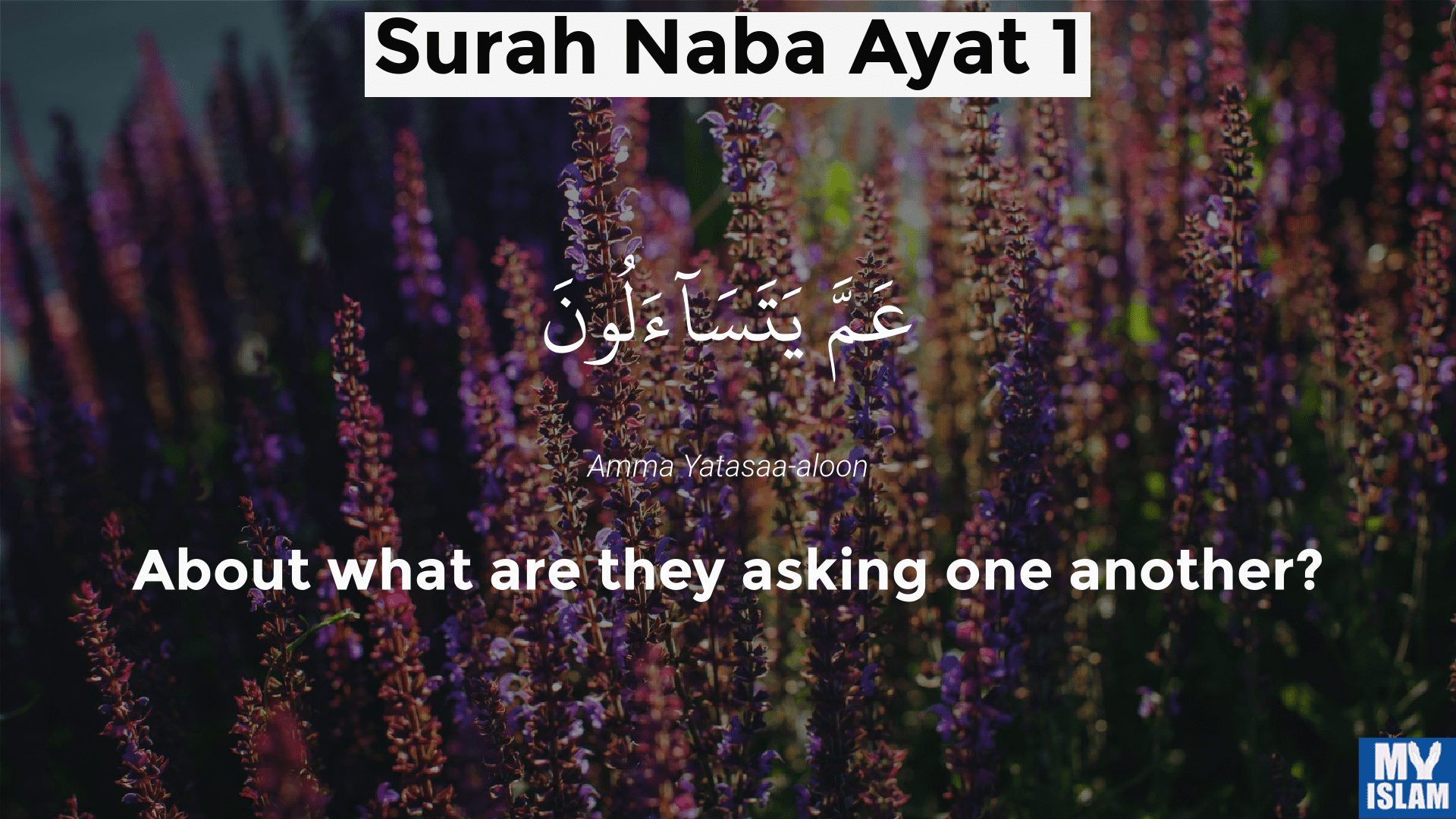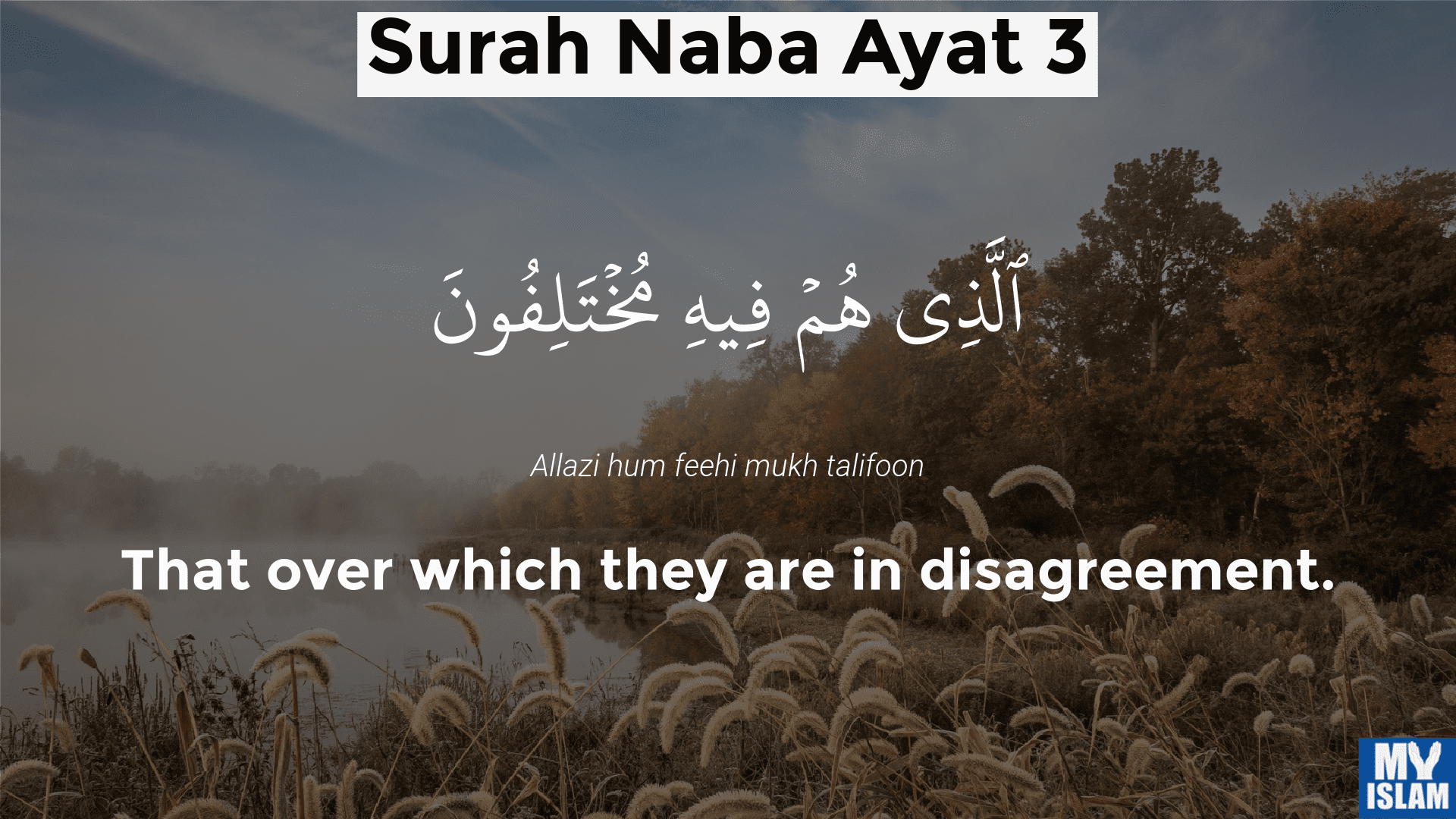Surah Naba Ayat 1 in Arabic Text
English Translation
Here you can read various translations of verse 1
About what are they asking one another?
Concerning what are they disputing?
About what are they asking one another?
What are they asking (one another)?
Whereof do they question one another?
Of what do they ask one another (questions)?
What are they asking about?
یہ لوگ کس چیز کے بارے میں پوچھ گچھ کر رہے ہیں
Quran 78 Verse 1 Explanation
For those looking for commentary to help with the understanding of Surah Naba ayat 1, we’ve provided two Tafseer works below. The first is the tafseer of Abul Ala Maududi, the second is of Ibn Kathir.
Ala-Maududi
(78:1) About what are they asking one another?
There is no commentary by Abul Maududi available for this verse.
Ibn-Kathir
1. What are they asking about 2. About the great news, 3. About which they are in disagreement. 4. Nay, they will come to know! 5. Nay, again, they will come to know! 6. Have We not made the earth as a bed, 7. And the mountains as pegs 8. And We have created you in pairs. 9. And We have made your sleep as a thing for rest. 10. And We have made the night as a covering, 11. And We have made the day for livelihood. 12. And We have built above you seven strong, 13. And We have made (therein) a shining lamp. 14. And We have sent down from the Mu`sirat water Thajjaj. 15. That We may produce therewith grains and vegetations, 16. And gardens that are Alfaf.
In rejection of the idolators’ questioning about the Day of Judgement, due to their denial of its occurrence, Allah says,
(What are they asking about About the great news,) meaning, what are they asking about They are asking about the matter of the Day of Judgement, and it is the great news. Meaning the dreadful, horrifying, overwhelming information.
(About which they are in disagreement.) meaning, the people are divided into two ideas about it. There are those who believe in it and those who disbelieve in it. Then Allah threatens those who deny the Day of Judgement by saying,
(Nay, they will come to know! Nay, again, they will come to know!) This is a severe threat and a direct warning.
Then, Allah begins to explain His great ability to create strange things and amazing matters. He brings this as a proof of His ability to do whatever He wishes concerning the matter of the Hereafter and other matters as well. He says,
(Have We not made the earth as a bed,) meaning, an established, firm and peaceful resting place that is subservient to them.
(And the mountains as pegs) meaning, He made them as pegs for the earth to hold it in place, make it stable and firm. This is so that it may be suitable for dwelling and not quake with those who are in it. Then Allah says,
(And We have created you in pairs.) meaning, male and female, both of them enjoying each other, and by this means procreation is achieved. This is similar to Allah’s statement,
(And among His signs is this that He created for you wives from among yourselves, that you may find repose in them, and He has put between you affection and mercy.) (30:21)
(And We have made your sleep as a thing for rest.) meaning, a cessation of movement in order to attain rest from the frequent repetition and going about in search of livelihood during the day. A similar Ayah has been mentioned previously in Surat Al-Furqan.
(And We have made the night as a covering,) meaning, its shade and darkness covers the people. This is as Allah says,
(By the night as it conceals it.) (91:4) Qatadah commented;
(And We have made the night as a covering,) meaning, a tranquil residence. Concerning Allah’s statement,
(And We have made the day for livelihood.) meaning, `We made it radiant, luminous, and shining so that the people would be able to move about in it.’ By it they are able to come and go for their livelihood, earning, business dealings and other than that as well. In reference to Allah’s statement,
(And We have built above you seven strong,) meaning, the seven heavens in their vastness, loftiness, perfection, precision, and adornment with both stable and moving stars. Thus, Allah says,
(And We have made (therein) a shining lamp.) meaning, the radiant sun that gives light to all of the world. Its light glows for all of the people of the earth. Allah then says,
(And We have sent down from the Mu`sirat water Thajjaj.) `Ali bin Abi Talhah reported from Ibn `Abbas that he said, “From the Mu`sirat means from the clouds.” This was also stated by `Ikrimah, Abu Al-`Aliyah, Ad-Dahhak, Al-Hasan, Ar-Rabi` bin Anas, Ath-Thawri, and it is preferred by Ibn Jarir. Al-Farra’ said, “They are the clouds that are filled with rain, but they do not bring rain. This is like the woman being called Mu`sir when (the time of) her menstrual cycle approaches, yet she does not menstruate.” This is as Allah says,
(Allah is He Who sends the winds, so that they raise clouds, and spread them along the sky as He wills, and then break them into fragments, until you see rain drops come forth from their midst!) (30:48) meaning, from its midst. Concerning Allah’s statement,
(water Thajjaj) Mujahid, Qatadah, and Ar-Rabi` bin Anas all said, “Thajjaj means poured out.” At-Thawri said, “Continuous.” Ibn Zayd said, “Abundant.” In the Hadith of the woman with prolonged menstrual bleeding, when the Messenger of Allah said to her,
(I suggest you to make an absorbent cloth for yourself.)” Meaning, `dress the area with cotton.’ The woman replied, “O Messenger of Allah! It (the bleeding) is too much for that. Verily, it flows in profusely (Thajja).” This contains an evidence for using the word Thajj to mean abundant, continuous and flowing. And Allah knows best. Allah said,
(That We may produce therewith corn and vegetation, and gardens that are Alfaf.) meaning, `so that We may bring out great abundance, goodness, benefit, and blessing through this water.’
(grains) This refers to that which is preserved for (the usage) of humans and cattle.
(and vegetations) meaning, vegetables that are eaten fresh.
(And gardens) meaning, gardens of various fruits, differing colors, and a wide variety of tastes and fragrances, even if it is ingathered at one location of the earth. This is why Allah says
(And gardens that are Alfaf.) Ibn `Abbas and other said, “Alfaf means gathered.” This is similar to Allah’s statement,
(And in the earth are neighboring tracts, and gardens of vines, and green crops, and date palms, growing into two or three from a single stem root, or otherwise, watered with the same water; yet some of them We make more excellent than others to eat. Verily, in these things there are Ayat for the people who understand.) (13:4)
Quick navigation links






